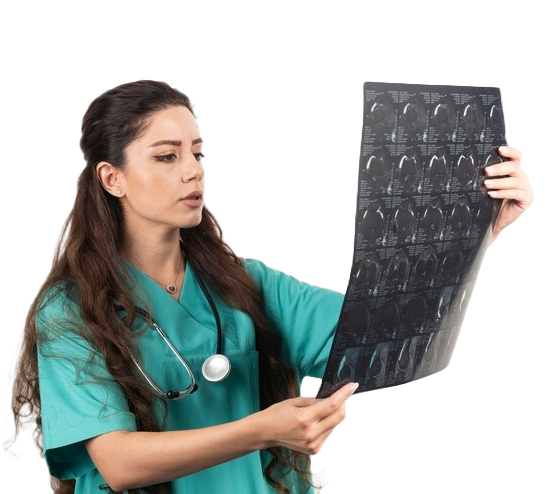Neurological Services
Dr. V. Sharma offers comprehensive neurology services using state-of-the-art diagnostics. Please call 703-778-1800 to schedule an appointment with the neurologist or for a sleep study.

Neurology is a medical specialty dealing with disorders of the nervous system. To be specific, it deals with the diagnosis and treatment of all categories of disease involving the central, peripheral, and autonomic nervous systems, including their coverings, blood vessels, and all effector tissue, such as muscle.
A neurologist is a medical doctor or osteopath who has trained in the diagnosis and treatment of nervous system disorders, including diseases of the brain, spinal cord, nerves, and muscles.
Neurologists perform neurological examinations of the nerves of the head and neck; muscle strength and movement; balance, ambulation, and reflexes; and sensation, memory, speech, language, and other cognitive abilities.
Conditions
We provide personalized care and diagnostic evaluations for the following conditions:
ADD/ADHD
Back Pain
Bell’s Palsy
Carpal Tunnel Syndrome
Chiari Malformations
Chronic Pain
CIPD
Dizziness
Dementias
Fibromyalgia
Gait Disorders
Headaches / Migraine
Insomnia
Multiple Sclerosis (MS)
Muscle Disorders
Neck Pain
Neuropathies
Pinched Nerves
Parkinson’s Disease
Seizures (epilepsy)
Sleep Disorders
Stroke/TIA
Tourette’s Syndrome
Tremors
Tumors
Common Tests
The Quotient ADHD Test gives objective and accurate data on the core symptom areas of ADHD:
- Hyperactivity (the inability to control movement and sit still while working)
- Impulsivity (the inability to inhibit inappropriate responses)
- Inattention (the difficulty in staying focused and on task)
Common tests performed:
- Electroencephalography (EEG)
- A nerve conduction study (NCS)
- Electromyogram (NCS)
- Electronystagmography (ENG)
- Polysomnography (PSG)
- Magnetic Resonance Imaging (MRI)
- Computed axial tomography (CAT)
- X-rays
- Positron emission tomography (PET)
- DATScan
- Various types of laboratory tests
Stroke Screening
A stroke occurs when the blood supply to part of the brain is suddenly interrupted or when a blood vessel in the brain bursts, spilling blood into the spaces surrounding brain cells. Brain cells die when they no longer receive oxygen and nutrients from the blood or there is sudden bleeding into or around the brain.
Before having a stroke, some people experience transient ischemic attacks (TIAs), also known as “mini-strokes.” These are mild strokes that result from a brief interruption of blood flow to the brain.
At Dr. V. Sharma Neurology Services, we offer preventive screening for the blood clots and plaque buildup that cause ischemic stroke.
Diagnosis
To diagnose and prevent stroke, we look at individual patients’ risks and general risk factors that can lead to a stroke. Based on the recommended guidelines and standard practice of medicine, once we identify risk factors in a patient, we will then tailor a treatment approach to treat these underlying conditions. Our goal is to diagnose conditions early, before the onset of neurological symptoms.
Screening Tools
We look at your: Full medical history, Family and social history, Physical examination, Blood tests, Depending on the case, Brain imaging, Heart monitoring, and/or Ultrasound of the arteries and the heart.
Memory Loss
Dementia is a general term for a decline in mental ability severe enough to interfere with daily life. Memory loss is an example. Alzheimer’s is the most common type of dementia.